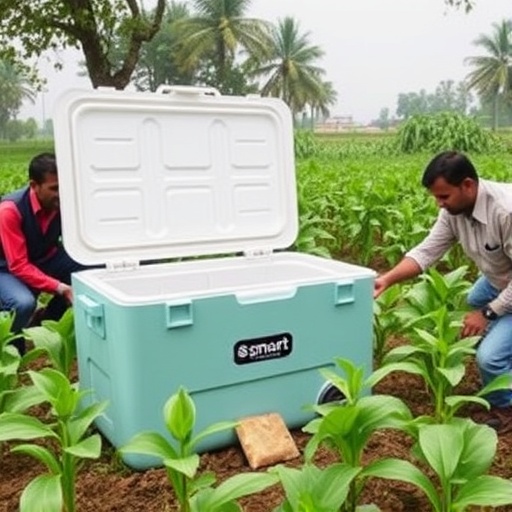In a world that continually faces the challenges of food waste and post-harvest losses, innovations in agricultural technology have become essential. A groundbreaking study conducted by Saha, Biswas, and Ahamed investigates the impact of a smart horticultural cooler designed specifically for Bangladesh’s unique agricultural landscape. This research, published in Discov Agric, marks a pivotal moment in addressing the significant post-harvest losses of perishable crops that farmers routinely face in this region.
In Bangladesh, the agricultural sector is both vital and vulnerable. A large portion of the population relies on agriculture for their livelihoods, yet many farmers grapple with the immense challenge of preserving their produce once harvested. Perishable crops, which are susceptible to rapid deterioration, pose a particular challenge. Traditional storage methods often fall short, leading to immense losses and economic strain on farmers and communities alike. The search for an efficient solution to mitigate these losses has led to the development of innovative technologies tailored to local needs.
The researchers embarked on their exploration by evaluating the design and functionality of a smart horticultural cooler. This cooler is engineered with advanced technological features aimed at maintaining optimal storage conditions for fruits and vegetables. By closely monitoring temperature and humidity levels, the cooler ensures that crops remain fresh for extended periods, thus significantly reducing spoilage rates. This innovation could revolutionize the supply chain for perishable crops in Bangladesh and enhance food security.
By integrating smart technology into the horticultural cooling process, the cooler offers numerous advantages over conventional refrigeration methods. One standout feature is its ability to provide real-time data analytics, allowing farmers to monitor storage conditions remotely. Interconnected with mobile applications, this system not only empowers farmers with information but also cultivates a user-friendly experience that makes the technology accessible to those with minimal technical expertise.
The research highlights practical testing conducted in various farming communities across Bangladesh. By implementing the smart cooler in these settings, researchers meticulously documented its performance. The findings show a marked decrease in spoilage rates when compared to traditional storage methods, demonstrating its efficacy in maintaining freshness. Farmers who utilized the cooler reported greater satisfaction and improved financial outcomes, ultimately fostering a more resilient agricultural economy.
It’s essential to understand that this innovation is not merely about adding a modern appliance to the agricultural landscape. The smart horticultural cooler serves as an educational tool, bridging the gap between technology and traditional farming practices. By understanding how to operate the cooler effectively, farmers are gaining crucial knowledge about crop storage and management. This educational aspect is vital in a country where many smallholder farmers may resist adopting new technologies due to fear of inadequacy or unfamiliarity.
Moreover, the impact of the smart cooler extends beyond the immediate benefits of prolonging shelf life. By minimizing post-harvest losses, farmers are able to increase their profit margins, leading to enhanced income stability for their families and communities. When farmers are less burdened by losses, they can allocate resources more efficiently, invest in improved agricultural practices, and create a ripple effect of positive change within the region.
The study also advocates for broader policy implications surrounding agricultural innovation and food security. By showcasing the success of the smart horticultural cooler, the researchers call upon governmental and non-governmental organizations to support the dissemination of such technologies. Investments in agricultural technology can pave the way for smarter, more sustainable food systems that cater to the growing population while addressing the dire issue of food waste.
However, the journey is not without its challenges. While the smart horticultural cooler shows exceptional promise, effective implementation in rural areas demands infrastructural improvements. Many farmers may lack consistent access to electricity, thus limiting the effectiveness of even the most sophisticated cooling technologies. Therefore, collaborative efforts are needed to address these barriers and foster an environment conducive to technological adoption.
Additionally, scalability remains a critical concern. For the smart cooler to have a widespread impact, manufacturers and stakeholders must consider how to produce and distribute the technology efficiently. Localized production may offer a solution, fostering job creation while reducing costs associated with importing technology. It’s vital that the cooler becomes a sustainable solution that is economically viable for farmers across different communities.
As the research indicates, the smart horticultural cooler is a significant step towards minimizing post-harvest losses and enhancing the livelihoods of farmers in Bangladesh. With proper implementation and continued support, this technology could serve as a model for similar innovations across nations experiencing comparable challenges. By addressing the unique needs of farmers and creating solutions tailored to their environments, we can forge a path toward a future where agricultural waste is dramatically reduced, benefiting not only farmers but society as a whole.
With the evolution of agricultural technology continuing to gain momentum, this study exemplifies the potential for innovation to drive social and economic change. The smart horticultural cooler stands as a beacon of hope, showcasing how combining knowledge, technology, and community engagement can lead to sustainable agricultural practices, ultimately ensuring food security for future generations.
Subject of Research: Evaluation of a smart horticultural cooler for minimizing post-harvest losses of perishable crops in Bangladesh.
Article Title: Evaluation of a smart horticultural cooler for minimizing post-harvest losses of perishable crops in Bangladesh.
Article References:
Saha, C.K., Biswas, S., Ahamed, S. et al. Evaluation of a smart horticultural cooler for minimizing post-harvest losses of perishable crops in Bangladesh.
Discov Agric 3, 148 (2025). https://doi.org/10.1007/s44279-025-00330-4
Image Credits: AI Generated
DOI: 10.1007/s44279-025-00330-4
Keywords: Smart horticultural cooler, post-harvest losses, perishable crops, Bangladesh, agricultural technology, food security.
Tags: advanced cooling technologies for produceagricultural technology innovationsBangladesh agricultural challengesclimate-resilient agriculturecrop storage solutions for farmerseconomic strain on farmersfood waste reduction solutionsimpact of technology on food preservationpost-harvest losses in agriculturepreserving perishable cropssmart horticultural coolersustainable farming practices





